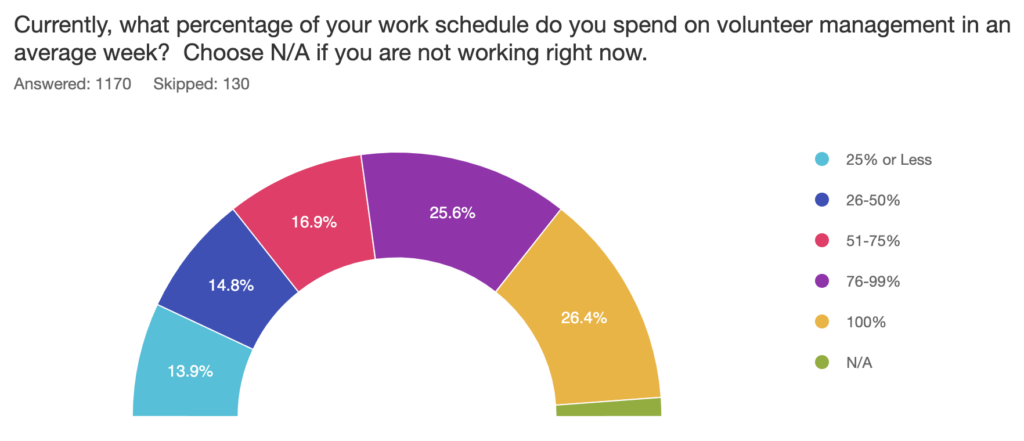Our Top 5 Time-Saving Tips for Volunteer Managers – How to Do More with Less
We are often asked about time saving tips for volunteer managers, and it’s no surprise.
The job of a leader of volunteers is multi-faceted and challenging. Leaders of volunteers are responsible for program design, evaluation, recruitment and marketing, supervision and communications, training design and delivery, risk management, database management, and reporting. The list goes on.
The role combines both people and paperwork. Volunteer managers are challenged to proactively respond to the emotional and informational needs of volunteers, co-workers, leadership, and external stakeholders as well as document and share impact data on the work of volunteers.
There are few roles in the nonprofit landscape that encompass such a wide range of tasks and competencies.
So, it’s no wonder that many have struggled to manage it all.
What’s more, the job also often includes other tasks and responsibilities outside volunteer engagement that the employee must juggle.
A preliminary review of the results from this year’s Volunteer Management Progress Report survey, revealed that few volunteer managers have the luxury of spending 100% of their time and attention on volunteer coordination and most split their time with other duties.
In our recent survey, we asked leaders of volunteers to share what percentage of their time they spend on volunteer management. Only 26.4 percent (about one out of four), are dedicated full time to the volunteer program. Nearly half (45.6 percent) can devote less than half their time to volunteer services.
In our 2021 survey, only 24 percent of volunteer managers spent 100% of their time on volunteer management, the lowest in five years (down from a high of 31%. In 2018).
Our data have confirmed that the volunteer managers indeed wear many hats.
So, what can you do about it? How can you increase your productivity and keep your sanity?
Read on to learn how!
Want to see the full report? Visit our Volunteer Management Progress Report page in January 2022 when the report will be released. You can also download previous reports HERE >>
5 Time-Saving Tips for Volunteer Managers
Below are some of our most often recommended time-saving tips that can help you boost productivity and, at the same time, reduce your stress as a volunteer manager.
Tip #1: Distribute the Workload Throughout Your Organization
While nearly all of the tasks related to volunteer engagement are commonly assigned to the volunteer manger, this is not necessarily the most efficient. Rather than relying on the “we’ve always done it this way” approach, why not take a step back and re-assess how you can collaborate more effectively across departments?
Consider which departments are best equipped to carry out specific tasks. For example, would the agency’s communications and marketing staff have the best tools, expertise, and connections to create and manage volunteer recruitment? What tools and software do they have access to that would make short work of a volunteer recruitment campaign? Would it make the most sense for them to fold this activity into the organization’s larger editorial calendar?
Tip #2: Share the Load with Volunteers
If you are struggling with a lack of time to get it all done, why not recruit a crew of volunteers to help? This seems like an easy decision, but you would be greatly surprised at how many volunteer coordinators have not taken this simple step.
Expanding the roles of volunteers can help you focus on the most critical parts of your job, while growing volunteer skills and creating a more efficient team. Here are a few ways we recommend our VolunteerPro Premium Community members pinpoint things that they may want to delegate.
Review the following to find areas you can increase efficiency.
- To-Do List(s) – look through your daily, weekly, monthly, quarterly to-do lists. Does everything need your individualized touch, or could you train a capable volunteer to take on some of the responsibility?
- Goals – Look at the goals you set for the year. How’s your progress at meeting those goals? Are there any that could be hastened with the help of another person?
- Processes – Take a look at your regular processes; client intake, scheduling, inventory, training, etc.… Which tasks could be managed by volunteers?
- Productivity – Are there any bottlenecks that could be smoothed out if a volunteer were added to the mix?
Also, consider these specific tasks and areas as possibilities for delegation.
- Repetitive Tasks – If it’s a repetitive task, then you can train someone else to take it on.
- Your Weaknesses – Don’t waste your time on things that aren’t your strengths
- Things You Hate to Do – If you hate them, they probably aren’t getting them done.
- Areas Where You’re Not an Expert – Don’t waste your time learning new roles or skills unless it’s essential to development.
- Tasks That Monopolize Your Time – Time-consuming tasks need to be looked at carefully for delegating opportunities, even if it’s only partial delegation.
- Tasks that Remove You from the Role of Leader – Your role is to be a visionary and focus on growth, that’s hard to do if you’re always in the trenches.
Involving volunteers in your own operations is also one of the best ways to get buy-in from co-workers on including volunteers in their departments as well.
By “walking the talk,” you show your co-workers that you believe in the power of volunteers so much that you are willing to include them in support of volunteer services, too.
Plus, this helps you better understand the current challenges that pop up when supervising volunteers in today’s evolving world.
For a step-by-step guide on How to Master Effective Delegation in Volunteer Management, go HERE >>
Tip #3: Mono Task for Less time Post to Switching
While you may feel like you’re successfully juggling ALL the balls at once, research shows that the ability to multi-task is a myth. In fact, most human brains can only attend to one thing at a time.
In addition, as you switch between tasks, you lose time because your brain needs to re-calibrate. Moreover, research shows that task switching, over the long term, can harm our ability to maintain focused work. And this inability to maintain attention may lead to an inability to develop wisdom.
So, rather than keeping you email open while working on other tasks, a better way to set aside blocks of time for uninterrupted “mono-tasking” or deep work.
This also requires that you communicate when you are, and are not, available. On my team, we check on Slack and let others know when we are offline and focused on deep work. We respect each other enough to be supportive of their need to get things done without interruption.
For volunteers and co-workers who need to check in with you, consider setting aside office hours where you have an “open-door policy” and welcome drop ins. Alternately, set up a Calendly link where your team can book time with you during availability blocks you set aside that work for your schedule.
Explain why this is important and don’t give in to someone who just need is a “few minutes of your time.” Not only are you giving those “few minutes” away, but you are also losing time as you stop and re-start the task you were focused on.
Researchers estimate that workers lose on average 1.5 hours a day to task switching and re-orienting themselves to their work. That’s nearly a full day of work every week!
So, be firm but polite about your boundaries. It really does mean you can get MUCH more done with a little more discipline.
Tip #4: Plan Out a Mega Batching Schedule
Bundling similar tasks can also save time. If you continue to work on the same task, there’s no need to open new software, re-orient your brain, and sometimes work (think: copywriting) can be re-purposed across similar projects.
Task batching, or bundling, refers to grouping similar tasks or processes and completing them together. For example, you may batch all the phone calls you need to make and do them in one sitting, rather than spreading them out over the day.
Same goes for checking email. You may decide to only check and respond to email once or twice a day. Batching or scheduling this “shallow work” for recurring times on your calendar can help you feel more in control and get things completed more quickly.
For deep work, try “mega-batching,” or bundling larger tasks into specific days or times of the month.
This technique is perfect for research, content creation, copywriting, program development, project planning, and data analysis and reporting.
It requires a little planning, but it is well worth it. In the past year, we’ve been batching most of our blog content, social media posts, and newsletters.
We write our core content (our blogs) first over the course of a single week, then post and schedule them on our website to appear on certain days, then schedule the social media posts and emails to distribute them, and finally create and schedule our newsletters that include them.
The trick to mega batching is to schedule out time to complete the task on a regular, rolling basis each month. Our goal is to have things written and scheduled out for a month in advance.
While it’s not always possible, when we are able to do this, the stress level goes way down because we are not scrambling to write tings last minute. This also helps us be more thoughtful and purposeful about the content we create and how it relates to our goals.
This time saving tip can also be helpful for volunteer managers. Consider how you might mega batch a volunteer recruitment campaign, or your regular volunteer communications, or your volunteer training design and development.
Any large projects that are recurring and take considerable time can become more efficient using mega batching
Tip #5: Take a Vacation to Re-Fuel
I’ve written about being overwhelmed and burned out before and how I took time out to re-charge my brain.
There are points in time when you must accept that you are no longer productive and that no matter how hard you push, you simply can’t get more done.
This fact is particularly hard to accept if you are a high achiever whose identity is wrapped up in results (believe me, I GET you!).
If this, is you, consider changing how you view time off. Is it about “slacking” or being “lazy”? Or is it really about professional level self-care that allows you to be your best self in and out of work?
The fact is, vacations can increase productivity. BUT, to boost your productivity, you must actually stop and rest.
So, see if you can take even a day off from task-based work.
Certainly, a week-long vacation would be fabulous, but not always possible. Start small, one day at a time. Binge movies on the couch for a day, go for a weekend away from screens and electronics, or get that week vacay on the books.
You’ll return more refreshed and productive for it and you can make up for lost time faster than before.
Check out 8 More Time Saving Tips for Volunteer Managers HERE >>
 Save Time with Better Volunteer Management Tactics, Too!
Save Time with Better Volunteer Management Tactics, Too!
Working with teams can sometimes feel like herding cats – you want them to zig and then they zag!
It also can feel like you are spinning your wheels and wasting time.
But there is a better way.
You can save time, and boost team productivity by employing leadership tactics that inspire volunteers to a specific outcome, rather than constantly nagging them to follow through and get things done.
More productive volunteers = more productive you!
If a focused and energetic volunteer team is the goal, it helps to know something about human behavior. Luckily, we have a mini-course to get you started!
FREE Mini Course – The Art & Science of Volunteer Accountability
Inspire Positive Volunteer Team Outcomes with Our Free Course
In this short course, you will learn how to …
- Address three fixed mindsets that may be holding you back
- Use the psychology of trust to deepen volunteer commitment and follow-through
- Four Supervisory foundations that will be the key to your success
- Build a culture of commitment using our simple four-part formula
You’ll also get these free downloads …
- [Worksheet] The Miracle Mindset
- [Cheat Sheet] Five Common Myths & Mindsets About Volunteers







